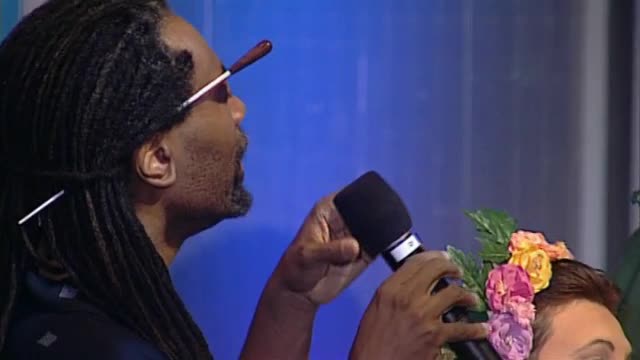Iconic and controversial violinist Nigel Kennedy comes from a family of distinguished musicians. His grandfather Lauri Kennedy was principal cellist of the BBC Symphony Orchestra and performed with artists such as Kreisler and Primrose; his grandmother Dorothy was a pianist who worked with singer John McCormack; his father John was principal cellist of the Royal Philharmonic Orchestra. Nigel studied at the Yehudi Menuhin School and then with Dorothy DeLay at the Juilliard School. He made his public début with the Mendelssohn Violin Concerto in E minor in 1977, and was the subject of a five-year BBC documentary, Coming Along Nicely, around the same time.
Kennedy’s maverick tendencies manifested themselves before his career began; he failed to graduate from the Juilliard, remarking later: ‘I was already getting gigs, and nobody was asking me for my diploma…I didn’t like the school, where the concentration was mainly on technical things.’ He kept up with Dorothy DeLay for some years, however, describing her as ‘a gold mine of information’. His ‘gigs’ included (against his Juilliard mentors’ advice but following, naturally perhaps, in Menuhin’s footsteps) a Carnegie Hall appearance with jazz violinist Stéphane Grappelli—one of the first signs that his career would involve seamlessly combining disparate musical styles: ‘People can say I’m a classical violinist if they want to, but I’ve always viewed myself as a musician who plays music, and not just a certain part of it.’ One of his favourite instruments is a 1707 Stradivarius. Loaned to him by a Cornish music lover, it was known as ‘The Cathedral’, but Kennedy renamed it ‘The Animal’. He also plays a five-stringed Violectra electric violin.
In 1984, after recording the Elgar Sonata with Peter Pettinger (a performance that ranges from fiery and aggressive at the opening to pleadingly thoughtful in the slow movement), he persuaded the producer to continue with a spontaneous session of jazz standards (including Body and Soul selected here). His eclecticism manifests itself further in improvising outlandish cadenzas in concert (which he admits have not always worked without a written plan!). More controversially, perhaps, his attitude is manifested in his sartorial choices and use of a cockney accent and ‘street’ language (the early BBC documentary shows that as a youth he was extremely well-spoken). This has fuelled strong disapproval on occasion from the musical establishment, including John Drummond (then Controller of BBC Radio 3) who spoke of his ‘ludicrous clothes and grotesque, self-invented accent’. Of course, Kennedy is not the first to nurture a carefully-crafted persona to augment his appeal: Niccolò Paganini, for one, did the same, and Kennedy’s approach has been immensely successful. His famous 1989 Vivaldi ‘Four Seasons’ recording tapped artfully into popular culture and sold over two million copies, many to people who were not normally classical music consumers. His fusion of styles identifies him as an archetypal post-modern figure, ahead of his time at a point when such a concept was only just being invented.
The Bloch ‘Nigun’ recording here, made at a 1972 Menuhin School concert, displays Kennedy’s youthful strengths vividly. This is highly-characterised playing, full of emotive energy and a prodigious technique. There is some scrappiness in bowing and tone in places, but all such awkwardness had been removed by 1984 when he made his first commercial recording: Elgar’s Violin Concerto, in a majestic reading characterised by warm tone and direct connection with the listener right from the opening C sharp, with a refreshing economy of vibrato. The rest of this performance (which takes an expansive approach) is exceptionally fine, with an almost unearthly atmosphere in the cadenza of the finale. Kennedy seems particularly at home in the Walton Violin and Viola Concertos (1987), where the ambivalent mixture of nostalgia and hard-edged irony is well suited to his tone. Arguably, his viola playing is sometimes that of someone who is a better violinist but there is an absolutely natural sincerity in his musicianship here, as elsewhere.
Special mention must be made of the ‘Four Seasons’. Interestingly, much of this is conventional playing, delivered in a highly energetic style (which, with Kennedy leaping and stomping to direct his ensemble, was the main attraction for live audiences) with lots of right-arm attack. There are in fact some odd and somewhat dated features, including the molto-vibrato viola playing at the start of the slow movement. Not all of the concertos are like this, however. ‘L’Autunno’, in many ways the most challenging technically and interpretatively, is quite eccentric in Kennedy’s hands. There are odd ad libitum slides around the instrument before the slow movement, for example, and a little cadenza into the finale, neither of which accord with anything Vivaldi is likely to have recognised as extemporisation, although the spirit of them is right. Whether or not one considers Kennedy’s approach an artistic travesty or evidence of inspired genius, its uniqueness cannot be questioned.
In summary, Kennedy is one of the finest British violinists of the twentieth century. Whatever one’s reaction to his unorthodox image and his aggressively anti-elitist attitude, his playing should disarm even the harshest critic.
© Naxos Rights International Ltd. — David Milsom (A–Z of String Players, Naxos 8.558081-84)
| Title | |
| SPIRITS OF MUSIC (McFerrin, Kennedy) | |

|
SPIRITS OF MUSIC (McFerrin, Kennedy)
Composers:
Bach, Johann Sebastian -- Charpentier, Marc-Antoine -- Faure, Gabriel -- Handel, George Frideric -- Humperdinck, Engelbert -- Mendelssohn, Felix -- Monti, Vittorio -- Mozart, Wolfgang Amadeus -- Ravel, Maurice -- Vivaldi, Antonio
Artists:
Al-Kindi Ensemble -- Boine, Marie -- Bulgarian Voices "Angelite" -- Kennedy, Nigel -- Kroke -- Kuumba Singers -- Leipzig Gewandhaus Orchestra -- McFerrin, Bobby -- Rubens, Sibylla -- Whirling Dervishes of Damascus -- Wilhelm, Veronika
Label/Producer: EuroArts |
